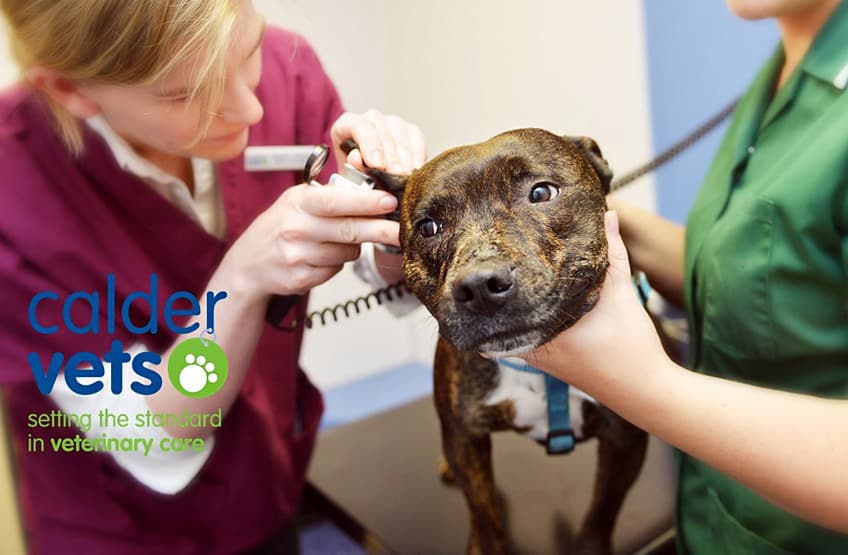To accurately determine if your dog has worms, look for symptoms such as vomiting, weight loss, diarrhea, bloody diarrhea, coughing, bloating, poor appetite, scooting, or visible signs of worms. In some cases, there may be no symptoms, and the only way to know for sure is by taking your dog to a veterinarian for an examination.
When it comes to the health of our furry friends, it is crucial to stay vigilant and identify any potential health issues they may be facing. One common problem that dogs can experience is having worms. These parasites can wreak havoc on their health if left untreated.
However, determining whether your dog has worms can be challenging, as the symptoms may not always be obvious. We will discuss how you can tell if your dog has worms and the necessary steps to take for their well-being. By knowing the signs and seeking professional guidance, you can ensure that your dog receives proper treatment and care.

Credit: www.caldervets.co.uk
Understanding Worms In Dogs
It can be difficult to determine if your dog has worms as some dogs may not show any symptoms. The only way to know for sure is through a veterinary examination. However, signs of worms in dogs can include vomiting, weight loss, diarrhea, coughing, bloating, poor appetite, scooting, and visible signs of worms in their stool.
What Are Worms And How Do Dogs Get Them?
Dogs are susceptible to various types of worms that can cause health issues. Worms are parasites that enter a dog’s body and live in their intestines or other organs. They can be contracted through various means, such as ingestion of contaminated food or water, contact with infected animals, or through the mother during pregnancy or breastfeeding.
Common Types Of Worms In Dogs
There are several common types of worms that can affect dogs:
- Roundworms: These are the most common type of worms in dogs and can be easily transmitted to puppies through their mother’s milk or feces. They appear as long, spaghetti-like worms in the dog’s stool or vomit.
- Tapeworms: Dogs can get tapeworms by ingesting fleas or infected animals. Tapeworms appear as small, rice-like segments in the dog’s stool or around their anus.
- Hookworms: Hookworms can enter a dog’s body by penetrating their skin or by ingestion. They can cause anemia and other complications. These worms are not usually visible in the dog’s stool.
- Whipworms: Dogs can get whipworms by ingesting the eggs present in contaminated soil or feces. They appear as tiny, thread-like worms in the dog’s stool.
Signs And Symptoms Of Worm Infestation
Detecting worms in dogs can be challenging as some infected dogs may not show any visible signs. However, there are a few common symptoms that could indicate a worm infestation:
- Vomiting: Dogs with worms may experience recurrent vomiting.
- Weight loss: An unexplained decrease in weight could be an indication of worms.
- Diarrhea: Dogs with worms may have loose or bloody stools.
- Coughing: Some types of worms, such as lungworms, can cause coughing.
- Bloating: Dogs with worms may have a swollen or distended abdomen.
- Poor appetite: Infected dogs may show a lack of interest in food.
- Scooting: Dogs may drag their bottom along the ground, which can be a sign of intestinal discomfort due to worms.
- Visible signs of worms: In some cases, worms may be visible in the dog’s stool or vomit.
If you notice any of these signs or suspect that your dog may have worms, it is important to consult with your veterinarian. They can perform a thorough examination and recommend the appropriate treatment to eliminate the worms and prevent further complications.
References:
- Worms In Dogs | Intestinal Worms Symptoms and Treatment
- Worms in Dog Poop: How to Identify & Treat Them – Hill’s Pet Nutrition
- How to Deworm your Dog – A to Z Vet Supply
- How to Tell If Your Dog Has Worms – PetMD

Credit: www.bluecross.org.uk
Diagnosing Worms In Dogs
Taking A Fresh Stool Sample To The Veterinarian
If you suspect that your dog has worms, one of the most common ways to diagnose them is by taking a fresh stool sample to your veterinarian. When you notice any changes in your dog’s behavior or if you see signs of worms such as vomiting, weight loss, diarrhea, bloody diarrhea, coughing, bloating, poor appetite, scooting, or visible signs of worms, it’s important to act promptly.
By collecting a fresh stool sample, you provide the veterinarian with the necessary material to examine and determine the presence of worms in your dog’s intestines. It’s essential to gather a recent stool sample as it increases the accuracy of the diagnosis and helps the veterinarian identify the specific type of worms affecting your dog.
Other Diagnostic Methods For Detecting Worms In Dogs
While a fresh stool sample is the primary diagnostic method used by veterinarians, there are other ways to detect worms in dogs. These include:
- Blood tests: Blood tests can help identify antibodies or antigens that may be present in your dog’s blood as a result of a worm infestation.
- X-rays: X-rays can be used to identify certain types of worms, such as tapeworms, if they have developed into a large size or if they have migrated into other organs.
- Ultrasounds: Ultrasounds are useful for detecting internal abnormalities and areas of inflammation caused by worms.
It’s important to note that these additional diagnostic methods may be used in conjunction with a fresh stool sample to provide a comprehensive assessment of your dog’s health and the presence of worms.
Regular fecal testing is crucial for maintaining your dog’s overall health and detecting the presence of worms at an early stage. Worm infestations can cause serious health issues, and early detection allows for prompt treatment and prevents the spread of infection.
Your veterinarian can advise you on how often your dog should undergo fecal testing based on their age, lifestyle, and overall health. By adhering to regular fecal testing, you can ensure your dog stays healthy and minimize the risk of complications associated with worms.
Treatment And Prevention Of Worms In Dogs
Detecting and preventing worms in dogs can be challenging, as some dogs may show no symptoms at all. However, if you notice vomiting, weight loss, diarrhea, bloody diarrhea, coughing, bloating, poor appetite, scooting, or visible signs of worms, it is crucial to consult a vet for proper examination and treatment.
Medication Options For Deworming Dogs
If you suspect that your dog has worms, it is important to seek the appropriate medication options for their treatment. There are several effective medications available for deworming dogs, which can be administered either orally or through injections. Some common medications include:- Fenbendazole: This broad-spectrum dewormer is commonly used to treat roundworms, hookworms, whipworms, and some tapeworms.
- Praziquantel: This medication specifically targets and eliminates tapeworms.
- Pyrantel Pamoate: This dewormer is effective against roundworms and hookworms.
Preventive Measures To Reduce The Risk Of Worm Infestation
Prevention is better than cure when it comes to worms in dogs. Taking proactive measures to reduce the risk of worm infestation can significantly benefit your furry friend’s overall health and well-being. Here are some preventive measures you can take:- Maintain a clean environment: Regularly clean your dog’s living area, including their bedding and toys, to minimize exposure to contaminated feces that may contain worm eggs.
- Practice good hygiene: Properly dispose of your dog’s feces and wash your hands thoroughly after handling their waste.
- Administer preventive medications: Regularly deworm your dog using preventive medications recommended by your veterinarian. These medications help eliminate and protect against common worms.
- Control flea populations: Fleas can transmit certain types of worms, so make sure your dog is protected from fleas through appropriate flea prevention measures.
The Role Of Veterinary Guidance In Deworming
When it comes to deworming your dog, it is essential to seek guidance from a qualified veterinarian. A veterinarian plays a crucial role in assessing your dog’s health, identifying the presence of worms, and prescribing the appropriate medication for treatment. Deworming medications vary depending on the type of worms your dog may have, their age, weight, and overall health condition. An accurate diagnosis and proper treatment administration require the expertise and experience of a veterinarian. Additionally, regular check-ups with your veterinarian can help detect any potential worm infestations early on, allowing for prompt treatment. Your veterinarian will also provide guidance on the best preventive measures, such as schedule recommendations for deworming and other necessary vaccinations to keep your dog healthy. Remember, the well-being of your beloved canine companion is best entrusted to a qualified veterinary professional who can provide the expertise needed for effective deworming and overall care.
Credit: www.goodrx.com
Frequently Asked Questions Of How Can I Tell If My Dog Has Worms
Can My Dog Have Worms Without Me Knowing?
Your dog can have worms without showing any symptoms. In some cases, the only way to know is through an examination by a vet. Worms may not always be visible in your dog’s poop, so it’s important to consult a professional for proper testing and treatment.
What Does Dog Poop Look Like If The Dog Has Worms?
Dog poop with worms may have visible signs of worms, such as tiny thread-like pieces for whipworms and spaghetti-like worms for roundworms. Tapeworms may not be seen in the poop, but their egg sacs, which look like grains of rice, might be present.
A vet examination is necessary for a proper diagnosis.
How Can I Test My Dog For Worms At Home?
To test your dog for worms at home, it’s best to consult a veterinarian for a proper examination. There may be no visible signs of worms, so a vet can diagnose and prescribe the appropriate treatment. Avoid self-medicating without professional guidance.
Can I Deworm My Dog Myself?
Yes, you can deworm your dog yourself using a shot or oral medication. However, it is recommended to take your dog to the vet for proper diagnosis and a prescription for the right medication. Vet-recommended medications treat multiple parasites, including worms.
Conclusion
It is important to note that some dogs may have worms without displaying any symptoms. This makes it essential to have regular check-ups with your vet and to provide them with fresh stool samples for examination. Identifying and treating worms promptly not only ensures your dog’s health but also prevents the spread of these parasites.
Remember, when it comes to your dog’s well-being, it’s better to be safe than sorry.



